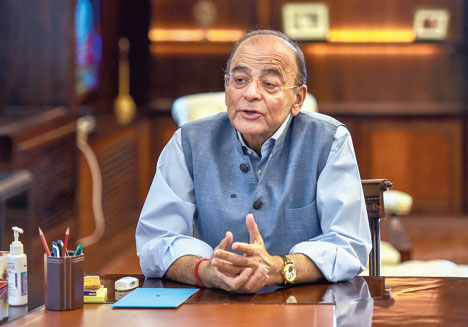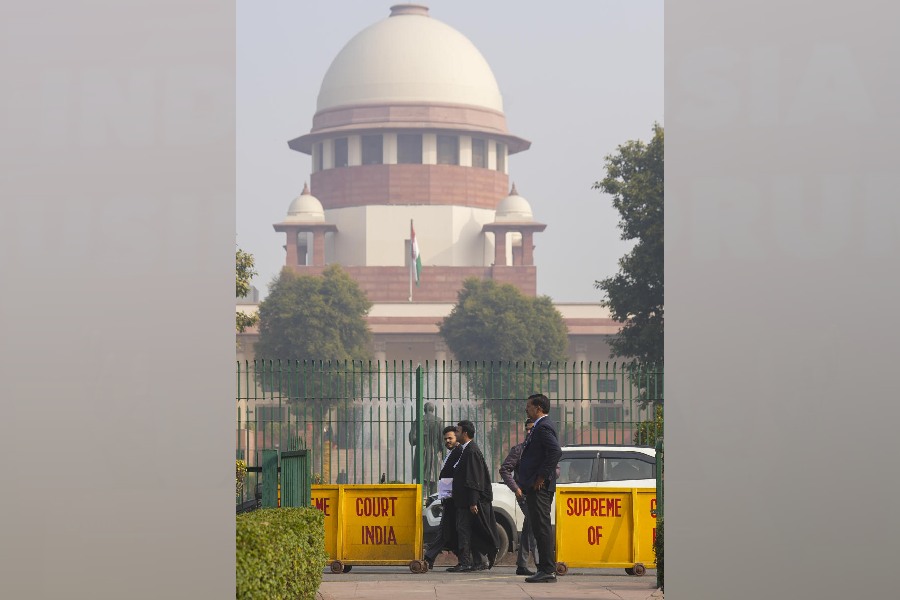THE MALLYA CONTROVERSY

New Delhi: Arun Jaitley would not have found himself composing purple prose garnished with phrases such as "factually false" had he stuck to a cardinal rule his finance ministry prescribes for those who file tax returns.
At the bottom of each form for filing the returns lurks a pledge: "I solemnly declare that to the best of my knowledge and belief, the information given in the return is correct and complete...." (italicisation by this newspaper for stress.) In short, full disclosure.
Instead, Rajya Sabha records suggest that Jaitley borrowed a principle from his original passion - the legal profession - and chose to share information on what he might have felt was a need-to-know basis.
On March 10, 2016 - a day after it became public knowledge that Vijay Mallya had left the country a week earlier on March 2 - the issue came up in the Rajya Sabha, and the Opposition asked how the defaulter was allowed to slip out.
That was a golden opportunity for Jaitley to volunteer and share information with the House that Mallya had tried to buttonhole him in the Central Hall of Parliament and there was a forced "one-sentence exchange".
Here's what Jaitley told Ghulam Nabi Azad of the Congress in the Rajya Sabha on March 10, according to the records: "Right now I have information about 22 cases which have been filed against him (Mallya).... He, too, has filed some cases. Besides this, several of his assets have been attached and banks are taking all steps to recover every paisa that has to be recovered from these people.... In Supreme Court... banks said his passport should be seized but he had left before that. If you want examples, then I can provide lots of examples of people... (interruptions). That day no agency had instructions to stop him.
"What you mentioned, you also referred to the other example of Lalit Modi and asked what has been done to get him back and when. He left during your government's time. You only registered a case under Fema under which there is no provision to stop him or punish him. You didn't file under PMLA (Prevention of Money Laundering Act), that was done later. Therefore, when this loan was given, how they became NPAs (non-performing assets), how NPA was restructured, if Azad Sahab wants to know, I will show him all the details in the chamber. At least, you need to do a lot of soul searching."
What might have sounded then as whataboutery has now assumed relevance against the backdrop of a claim by Mallya on Wednesday that he had told Jaitley he would be leaving for London. Jaitley has not specifically denied this claim although the finance minister had said in his rebuttal, which was issued before Mallya made the London trip statement, that their exchange was limited to one sentence on an offer to settle bank dues.
If Mallya indeed told Jaitley that he was planning a foreign trip and the finance minister could recall in the House in less than a fortnight that others, including Lalit Modi, had fled the country after allegations of economic offences emerged, the question arises whether one of the sharpest legal minds in the country with access to the topmost echelons of power alerted law-enforcement agencies and tried to stop Mallya.
Of the four agencies that were probing Mallya, two - the Enforcement Directorate and the Serious Fraud Investigation Office - report to ministries under Jaitley's direct watch. If Jaitley did alert any enforcement agency after the forced encounter with Mallya, he has not made it public till now.
The Telegraph tried to elicit a response from Jaitley for this report but was told that the minister was busy in a meeting. The minister did take part in a meeting on the economy on Friday.
As for the contention that there was no court order to stop Mallya from leaving the country, Azad reminded the House that Greenpeace activist Priya Pillai was stopped at Delhi airport from boarding a flight to London without a court order in January that year. "It was only the government order which stopped her travelling from Delhi to London, but in this case, we are being told that since there was no court order we couldn't stop this.... This is doublespeak...."
A couple of days later, Bhalchandra Mungekar, an economist whose Rajya Sabha term has since ended, raised the matter again. "A question was asked... as to how he was allowed to leave the country. The answer was who gave him the loan. It is most disgraceful. Let us not do this: 'we have done this because you have done this'. You claim to be a party with difference. People expect that you run the country differently. If you think that the Congress Party was wrong, what is the novelty in repeating the mistake that the Congress Party has made?"
On March 10, 2016, itself, Jaitley was gifted another chance at full disclosure.
During Zero Hour - the window when members can ask questions without notice - Congress leader Jairam Ramesh had cited a specific sequence of events that suggested laxity, if not collusion.
"Evidence has surfaced this morning that on the 28th February (three days before Mallya left), the banks met the lawyers and the lawyers told the banks to file a petition in the court on the 29th February to prevent Mr Mallya from leaving India. The banks did not file the case till the 5th March. Till the 5th March, the case was not filed. The attorney-general makes the admission that Mr Mallya has left for London on the 2nd March and this admission was made yesterday, on the 9th March. Sir, this evidence has come out," Ramesh said.
The Congress MP added: "The key issue is: why were the banks asked to delay approaching the courts to prevent Mr Mallya from leaving India? That is the only issue. The issue is not who gave loans to Mr Mallya. The issue is: why was Mr Mallya allowed to leave India, even though the lawyers had told the banks on the 28th February that, in view of the fact that Mr Mallya might leave India, the case should be filed on the 29th February? The case is filed on the 5th March. This is the real issue which the Leader of the House (Jaitley) has evaded."
Full disclosure would have meant Jaitley would have informed the House that Mallya, a member of the Rajya Sabha then, had run into him and tried to discuss the issue.
If Jaitley did so, there is no mention of that in the House records available in the public domain on the first part of the budget session when the controversy was at its peak.
Such a record would also have helped Jaitley fight the fire now raging around him and the government.
Four days later, Jaitley was offered another chance to set the record straight. It could not have been any more specific.
On March 14, 2016, the Congress issued a statement, asking Prime Minister Narendra Modi whether Mallya met and spoke to Jaitley before the liquor baron left the country.
"Whether Shri Arun Jaitley informed and gave details of this conversation to Prime Minister, Shri Narendra Modi? Will the complete details of this meeting and conversation be shared with Parliament and people of India?" the statement asked.
Mark Antony offered Julius Caesar the "kingly crown" thrice, "which he did thrice refuse". Arun Jaitley was also offered as many golden chances to set the record straight in a House as august as the Indian Parliament.
What neither the Rajya Sabha nor the Opposition could pull off was accomplished on September 12, 2018, by the "factually false" uttering of a fugitive now living it up in London.










